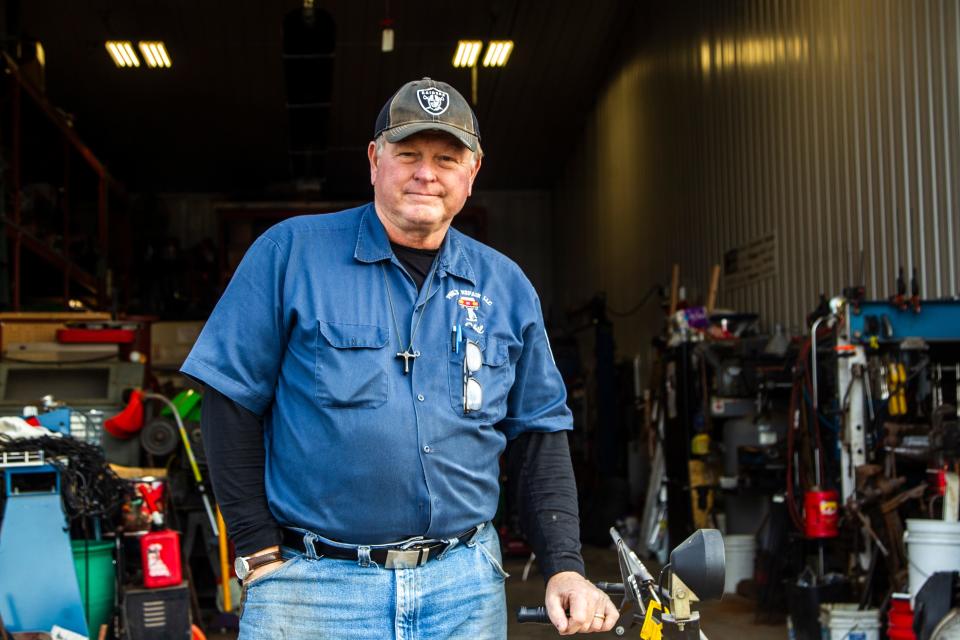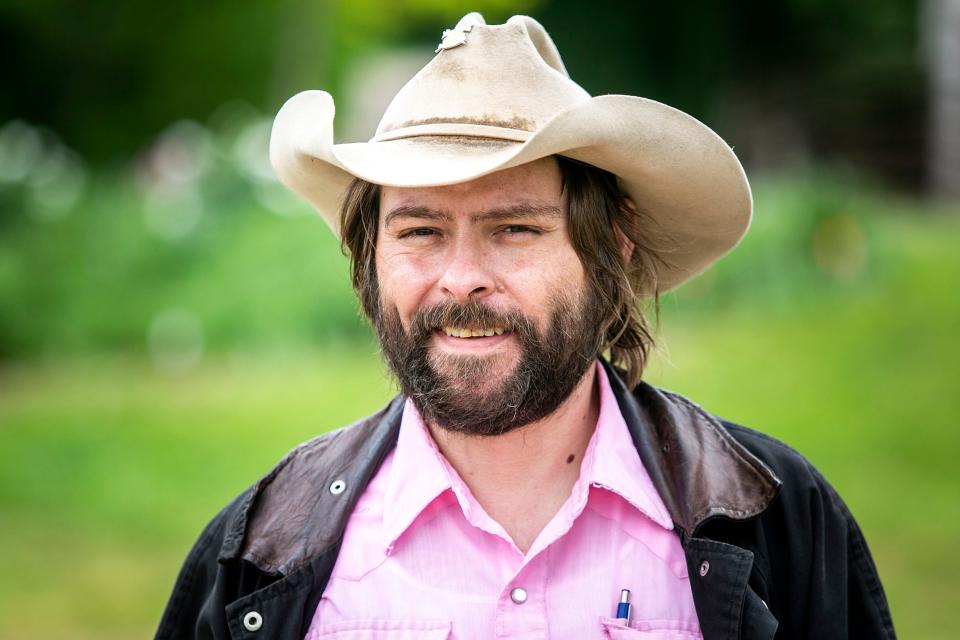Four candidates for Johnson County Supervisor debate affordable housing and climate change
Four candidates running for two seats on the Johnson County Board of Supervisors discussed key issues facing the community, including affordable housing, climate change and what each candidate views as the role of county government.
Supervisor Jon Green, a Democrat and the only incumbent, was joined by Democrat V Fixmer-Oraiz, Republican Jammie Bradshaw and Republican Phil Hemingway at a candidate forum hosted by the League of Women Voters at The Center in Iowa City on Tuesday. Eric Heick, a fifth candidate, is running unaffiliated and did not attend the forum.
The candidates were also asked about American Rescue Plan Act spending, the Direct Assistance Program and law enforcement. The full forum can be watched online at https://www.youtube.com/watch?v=avF7raxy9Kk.
Bradshaw, who lives just outside of Lone Tree, is a first-time candidate, a farmer and a U.S. Air Force veteran. She said she wants to make county government work better for its rural residents.
Fixmer-Oraiz is an Iowa City resident who is a founder and CEO of Astig Planning, a small business firm that focuses on climate change impacts and social and racial justice. If elected, they would be Johnson County's first transgender, queer, biracial county-wide elected official.
Green, a resident of rural Johnson County and the former mayor of Lone Tree, has served on the board for about two years since winning a special election to fill a vacancy. He stressed that experience often during the forum to tell the audience of about 30 people what county government does and what he believes it can do in the future.
Hemingway is a former Iowa City School Board member, small business owner and frequent candidate for the Board of Supervisors. He also wants to give a larger voice to rural residents and often criticizes the size of county government and how it operates.
Election Day is Nov. 8 and early voting begins Oct. 19. More information on the election can be found at https://www.johnsoncountyiowa.gov/auditor/elections.
More:Johnson County voting guide 2022: What's on the ballot, how to register and how to vote early
Candidates debate role of county government and salary for Supervisors
All four candidates were asked multiple times about the role of county government, the specifics of the job and the pay rate that comes with being elected to the five-member board. The candidates also discussed the accessibility of board meetings.
Hemingway criticized Johnson County, saying it leads the state in raising the salaries of Supervisors, which now sit at $89,129. The board approved a 2.25% increase this year that Green and the other Supervisors brought down from a proposed 18% increase. Green faced criticism from others on the board when he recommended the board take an even lower raise due to there being an extra pay period in 2022.
Hemingway pledged he would only take $71,240 if elected, the amount the board was paid in 2018, and donate the rest to agriculture education and Future Farmers of America.

Hemingway's focus on the salaries of the board members is nothing new. He often carries a sign to campaign events showing the increase of salaries for this elected office year over year since 2018.
"Talking with Supervisors in counties surrounding us, it's ridiculous. I am a working man. I've worked with my hands in agriculture and trades my whole life, and I know the value of a dollar," he said.
Pay rates for county Supervisors in Iowa vary and often depend on the size of the county and whether the Supervisors are considered full-time. Some other counties with large metropolitan areas like Polk and Linn pay Supervisors more than $100,000, while Scott County pays its Supervisors only $46,000-$49,000.
Hemingway expressed a desire for a more limited form of government and said he disagrees with the idea of a "muscular" board. He said he wants the county to focus on roads, bridges and essential services and making sure those are done efficiently and economically.
"I am for the county Supervisors concentrating on county issues and not trying to run the state," Hemingway said.
Green spent time in his opening statement laying out the specifics of county government, including the budget size, employment statistics, debt and more. He also touted recent accomplishments of the board, including sending out $1,400 stimulus checks to some residents through the Direct Assistance Program, which he promised was a "down payment" on the continued investments the board will make within Johnson County.
"Johnson County leads Iowa. But instead of congratulating ourselves over much, I think our successes inform the work that needs to be done," Green said.
Green pushed back on an assertion Hemingway made equating serving in public office to being a volunteer. He said he appreciates "the charity" people do in public service, but public service shouldn't be servitude. He said the pay rate of county Supervisors is a "live question" still.
"I took, basically, a $30,000 pay cut to take this job because I also believe in the work," Green said.

Bradshaw said she agreed with Hemingway. She said Supervisors are elected to be a leader and representative of the people and should focus on county issues, not state issues.
"Let's take care of what we can handle and make that change here, including helping our farmers," Bradshaw said.
Bradshaw also agreed that Supervisors are overpaid. She said she would always vote no on pay increases if she is elected.
"The median income in Johnson County is (over) $60,000. There's no reason that a representative for that county needs to make more than what the median income is," she said.
Fixmer-Oraiz said Johnson County has many resources like parks and a strong nonprofit community that make people want to live here. They said the county's role should be making sure everybody has what they need to thrive, and they want to make sure the county is able to plan for the future.
"That will get us to the best possible Johnson County for all, and that includes policies that affect the state level. We also know that local law is what is going to impact the state law, and we need to be leaders in that area," Fixmer-Oraiz said.
On the salary question, Fixmer-Oraiz said working as a Supervisor is time-consuming, but the pay rates could be reexamined.
They said they aren't running to get a paycheck, but they want to get to know the community more through this job and help it thrive. They said it is ludicrous anyone would run for office to get a paycheck.
"I can't imagine a world in which, as a Supervisor, I would be like, 'yeah, I should be making six figures,'" Fixmer-Oraiz said.
More:Politicians fan out in Johnson County for a day of old-fashioned door-knocking. Here's how it went.
Candidates pitch solutions to affordable housing in Johnson County
The candidates were asked two questions about affordable housing, including what projects and initiatives they would support to address the need for affordable housing and transit, and another about affordable housing in rural areas of Johnson County.
Fixmer-Oraiz, who is the vice president of the Johnson County Affordable Housing Coalition, said affordable housing is a core tenet of why they are running for the Board of Supervisors. They said they want to try and find land, potentially in the fringe areas between the cities and unincorporated Johnson County, and start carving out smaller lots for people to rent or own that they can afford.
"Affordable housing, as we know, is pretty hard to find in Johnson County, and right now we are in a crisis with our manufactured housing," they said.
Fixmer-Oraiz said the county needs to do what it can to incentivize affordable housing in rural areas and said an economic development position in the Iowa City Area Development Group was recently funded to help "main street" Iowa towns improve business structures and attract affordable housing in rural areas.

Bradshaw said her approach to the affordable housing crisis is looking at historic, but rundown, buildings and partner with local construction businesses, give tax breaks to them and repair and preserve these homes while training people to build more.
"(We would be) giving people a pathway to owning a home plus a new skill, and not just putting them in the same standard, rundown, government-funded public housing," Bradshaw said.
Bradshaw said affordable housing is lacking in rural areas and she wants to make buildings in small towns more accessible. She said adding more bike paths and a more robust public transportation system can bring development and help affordable housing exist.

Hemingway said he wants to bring down land values in Johnson County, which he said are some of the highest in Iowa. He said there are burdensome regulations that make building low-cost housing difficult and there are opportunities to partner with local communities and use programs like prison-built homes.
"The lot is gonna be expensive, the hookups to sewers are going to be expensive. It's in a rural area and might have to require a well. There's a multitude of challenges we're facing," he said.
Hemingway said the county needs to stop being "dictatorial" with its villages. He said the county has to recognize it is "blessed" to be in a place with agriculture productivity that the world is envious of.
Green said he's seen the need for affordable housing both when he was mayor of Lone Tree and while on the board in urban areas. He said Johnson County is only using 1% of its debt authority and sees an opportunity to work with cities to provide financing to add affordable housing or fund public-private partnerships.
Green said the county has to achieve a responsible balance by protecting natural resources and not encouraging "sprawl" in the rural areas. He echoed Hemingway and said residents of rural Johnson County will have to pay more to live in these areas because they have to have their own infrastructure, well, septic system and heating.
"If you want to live in rural Johnson County, you're going to have to assume a higher burden," he said.
Green said if housing pressures can be eased in urban areas, it can open up more resources in the rural areas.
Candidates agree preparing Johnson County for climate change should be a focus
Fixmer-Oraiz said when at their planning firm and looking 50 to 100 years into the future to deal with disasters like flooding, derechos and pandemics, they focus on helping the people who are the most vulnerable. That includes making access to transportation, clean water and the internet more equitable.
Fixmer-Oraiz said the county has to convene people at the emergency management department and in towns and cities and make sure infrastructure is put in place for disasters that will continue to happen.
"We need to be ready, and I have that experience," they said.
Bradshaw said she would support examining the electric grid to make sure it is up to standards and expand the bus system from Iowa City to communities like Lone Tree and Oxford to lower the carbon footprint.
"If we're gonna do things like that to affect climate change, let's actually make it so everyone in Johnson County has that ability to be a part of that and not just Iowa City," Bradshaw said.
Hemingway said he knows about the impacts of extreme weather because his business was flooded in 2008. He said there are things that can be done at the county level, but many solutions to addressing extreme weather are much larger than the county.
Hemingway referenced the Wolf-ADM carbon capture pipeline, which he said is being "forced" through the northwest part of Johnson County and said the board has little authority to impact it.
"(The pipeline) is a loser all the way around. Some of these things are difficult to challenge, but certainly bridges and roads need to be constructed in a way that reflect the changing issues," he said.
Green said that the emergency around climate change is happening right now. He said that, while Johnson County may not feel its impact every year, it has felt its impact with the derecho. He said the county is "flirting on the edge of drought right now" with low levels on the Iowa River, which his property borders.
Green said the county can lead by example, by adding solar panels on and around buildings and taking more direct action with its zoning code to encourage clean energy production and make sure it is done responsibly.
Green later addressed the pipeline as well and expressed more optimism about what the county could be able to do to combat projects like it. He's been a vocal critic of the pipeline, helping lead the board in its efforts to stand against it, should the proposed route enter Johnson County.
George Shillcock is the Press-Citizen's local government and development reporter covering Iowa City and Johnson County. He can be reached at (515) 350-6307, GShillcock@press-citizen.com and on Twitter @ShillcockGeorge
This article originally appeared on Iowa City Press-Citizen: Johnson County Supervisor candidates debate climate, housing, salaries

